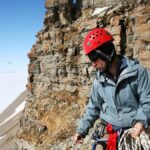For many graduate students, there’s a sort of unspoken understanding that considering or even planning to leave research is not something you are open with your advisor about, because they will not necessarily be accepting of the idea.
But the fact that there are far more doctoral degrees awarded in the sciences than there are jobs in academic research has led to greater awareness and discussion of alternative academic (alt-ac) and post-academic careers.
Today, it’s more common for advisors to be supportive of students who wish to pursue careers outside of academic research after their degrees are finished.
What does “alt-ac positive” support look like?
I spoke to three former PhD students either currently working or planning to work outside academia whose advisors helped them pursue their career goals.
Michelle Mileham is the Director of Education at Tracy Aviary. She completed her PhD in Environmental Science at Oregon State University. Toni Klemm is a postdoctoral research associate at Texas A&M University. He holds a PhD in geography and currently studies how climate change affects beef cattle production. Gil Costa is a freelance scientific graphic designer and illustrator. He completed his PhD in neuroscience at the Champalimaud Foundation in Lisbon.
Be open to non-academic career options
First and foremost, be open to the possibility that your students, even those hopeful about pursuing a tenure-track position, may not remain in academic research.
Students who feel that this isn’t a topic they’re able to broach with their advisor will miss out on any helpful advice or insight their advisor may be able to give them.




